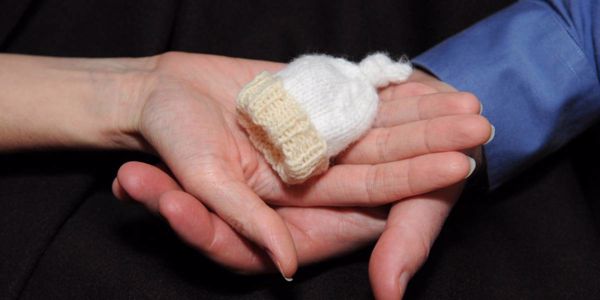Most instances of baby loss occur within the first 3 months of pregnancy, but any pregnancy loss before 24 weeks of gestation is classed as a 'miscarriage'. After this, they will be considered a 'still birth'. In most cases, the first sign of miscarriage is bleeding, however, this is not always the case and the news that your pregnancy has ended may not come until you have an ultrasound scan at 12 or 20 weeks.
Not all bleeding in early pregnancy is the sign of a miscarriage and can often be what is known as implantation bleeding. However, it is important to contact your GP if you do experience any vaginal bleeding at any time during your pregnancy. Miscarriage-associated bleeding is often followed by strong cramps and pain in your lower tummy. Once you have contacted your GP, you will likely be referred to your local early pregnancy unit for further investigation.
Causes of Miscarriage
In many cases, the true cause of your miscarriage will remain undetermined, leaving you wondering what on earth went wrong.
The first thing to note is that it is highly unlikely that there would have been anything you could have done differently. It is thought that most miscarriages are a result of chromosomal abnormalities, and your behaviour would not have impacted this in the slightest.
Sadly, sometimes they just happen for no reason.
What Happens When you are Experiencing a Miscarriage?
Experiencing a miscarriage can be scary and overwhelming, so it is important that you have your friends or family close by to support you. Once a miscarriage has been confirmed by scan, you will be supported by a specialist nurse or doctor who will explain your options. If your miscarriage has started naturally, you will likely be advised to let nature take its course, and for the pregnancy tissues to come away naturally. In some cases, especially if you are more than 12 weeks along, medication may be prescribed, or minor surgery recommended.
Every woman is different, and physical recovery can range from a few days to a few weeks. Some women feel quite run down and tired, whilst other women soon feel back to normal and the absence of pregnancy symptoms, such as nausea or vomiting can bring some relief during this time.
Your first period will usually start 4 to 6 weeks after the miscarriage bleeding has stopped but can take longer to get back into a regular pattern.
Moving Forward
It is important that you don’t underestimate both the physical and emotional toll that losing a pregnancy can have on both you and your partner. You are both likely to be feeling a whole host of emotions, from anger to confusion, and you may both deal with your loss in different ways. If either of you finds you are really struggling to navigate your feelings, speak with your GP to find out what mental health support is available in your area.
When you are both ready, you may want to think about trying for another baby. Just because you have had one miscarriage, it doesn’t mean you are more likely to have another one. Most women do go on to have a healthy pregnancy and baby following a pregnancy loss.
There is no fixed rule as to when the right time is to try for another baby. Make sure both you and your partner feel emotionally ready. It is advised to wait until your bleeding has stopped but even then, unless your doctor has advised against trying straight away, you are good to go. Lots of baby dust being sent your way!
What can I do to reduce the chances of having another miscarriage?
There isn’t anything you can do to prevent another miscarriage sadly, as most miscarriages don’t have an explanation. However, there are lots of things that you can do to get yourself into the best possible place - physically and emotionally. Try to get yourself physically in a good exercise and diet routine - eating lots of fruit, vegetables, and protein - with a little bit of a treat now and again! Do not underestimate the need to look after yourself mentally and emotionally too - seek help, if needed, from your GP or a fertility clinic. Do something to help you relax such as yoga, massage, or acupuncture. All these things can also help fertility.







